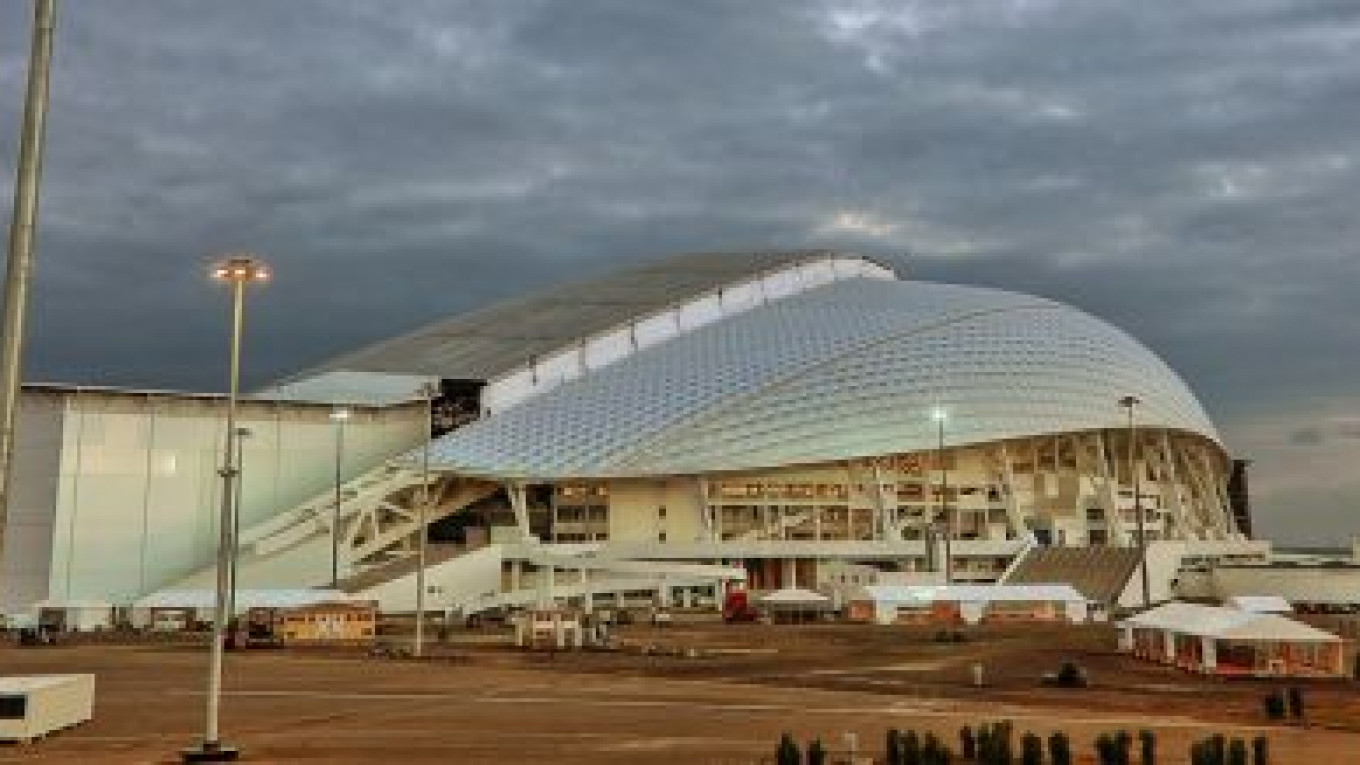With Sochi quickly becoming a focus of world attention as the finish line for preparations approaches for the Winter Games, the venue that will host the opening ceremony of Russia's largest international event in decades has still not been officially opened for use.
Fisht Olympic Stadium, which will host the opening and closing ceremonies but no sporting events, has for months now been the only remaining major Olympic venue that is unfinished. The cranes that loomed over the roof have finally finished their work, but the stadium has not been declared complete.
On Monday, Sports Minister Vitaly Mutko said the 40,000-person stadium would be finished in December, without naming a specific date, Gazeta.ru reported. If completed before the start of the new year, organizers would be left with little more than a month to put the finishing touches on the Feb. 7 ceremony that will open the games.
The original schedule had targeted completion of the stadium by Aug. 2013, but due to multiple redesigns, the deadline was repeatedly pushed back.
The Sochi Organizing Committee said that preparations for the opening and closing ceremonies to the Games in the stadium were ongoing.
In photographs, a white plastic covering is visible between the two giant arches of the stadium, making it impossible to see what the interior looks like and how the artists and technicians are able to rehearse for the opening show.
President Vladimir Putin visited Olympic sites on Nov. 29 and singled out the main stadium as a venue that officials "have to talk about and look into carefully."
Putin was accompanied by chief opening ceremony organizer Konstantin Ernst, the powerful head of Channel One state television, who showed Putin the spot where he will deliver his speech and the many racks that have been installed on the roof to mount heavy lighting and sound equipment.
The stadium was originally supposed to resemble two giant heaps of snow with a space in the middle open to views of both the Black Sea and the Caucasus Mountains, but was changed at the request of ceremony organizers to have a roof over the top.
As a result, a venue that was meant to show off Sochi's unique geographical setting between subtropical beaches and alpine peaks today looks like a colossal enclosed hall. Two pavilions next to the sides of the stadium have also been built to store decorations.
The pavilions and the roof will be dismantled after the Games in preparation for football matches, including for the 2018 World Cup.
As a result of all the changes, the cost of the stadium more than tripled from the original $344 million to more than $1 billion, according to prominent opposition figure and Sochi native Boris Nemtsov. The Games have a price tag of more than $50 billion, the most ever for an Olympic Games.
Olympic construction firm Olympstroi and representatives of Deputy Prime Minister Dmitry Kozak, the point man for Olympic preparations in the Cabinet, have not provided data on the final cost of the stadium.
International Olympic Committee member Jean-Claud Killy, who is responsible for the Sochi Olympics on the committee, plans to visit Russia next week to conduct an inspection, The Los Angeles Times reported.
Contact the author at i.nechepurenko@imedia.ru
A Message from The Moscow Times:
Dear readers,
We are facing unprecedented challenges. Russia's Prosecutor General's Office has designated The Moscow Times as an "undesirable" organization, criminalizing our work and putting our staff at risk of prosecution. This follows our earlier unjust labeling as a "foreign agent."
These actions are direct attempts to silence independent journalism in Russia. The authorities claim our work "discredits the decisions of the Russian leadership." We see things differently: we strive to provide accurate, unbiased reporting on Russia.
We, the journalists of The Moscow Times, refuse to be silenced. But to continue our work, we need your help.
Your support, no matter how small, makes a world of difference. If you can, please support us monthly starting from just $2. It's quick to set up, and every contribution makes a significant impact.
By supporting The Moscow Times, you're defending open, independent journalism in the face of repression. Thank you for standing with us.
Remind me later.






